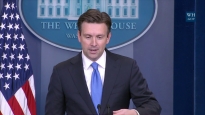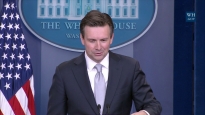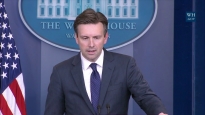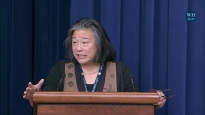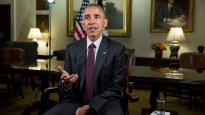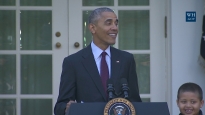Weekly Address: Traveling the Country, Winning the Future
February 26, 2011 | 4:18 | Public Domain
The President discusses his recent travels and the examples he’s seen of how America can win the future. He urges Congress to heed these examples in the coming budget debate and to tighten our belts without eliminating investments in innovation, education and infrastructure.
Weekly Address: "Investments in Education, Innovation, and Infrastructure are an Essential Down Payment on our Future"
WASHINGTON – In this week’s address, President Obama said that he expects Democratic and Republican leaders in Congress to find common ground as Congress focuses on a short term budget next week. The President will consider any serious ideas to reduce the deficit, regardless of which party proposes them. In fact, the President has already proposed freezing domestic spending, which would cut the deficit by $400 billion and bring this kind of spending to the lowest level, as a percentage of our economy, since the Eisenhower administration. But, cutting investments in education and innovation would hinder our ability to out-compete the rest of the world. While the President recognizes that everyone needs to be willing to sacrifice, we cannot sacrifice our country’s ability to win the future.
The audio and video of the address will be available online at www.whitehouse.gov at 6:00 a.m. ET, Saturday, February 26, 2011.
Remarks of President Barack Obama
As Prepared for Delivery
February 26, 2011
Washington, DC
Over the last month, I’ve been traveling the country, talking to Americans about how we can out-educate, out-innovate, and out-build the rest of the world. Doing that will require a government that lives within its means, and cuts whatever spending we can afford to do without. But it will also require investing in our nation’s future – training and educating our workers; increasing our commitment to research and technology; building new roads and bridges, high-speed rail and high-speed internet.
In cities and towns throughout America, I’ve seen the benefits of these investments. The schools and colleges of Oregon are providing Intel – the state’s largest private employer – with a steady stream of highly-educated workers and engineers. At Parkville Middle School outside of Baltimore, engineering is the most popular subject, thanks to outstanding teachers who are inspiring students to focus on their math and science skills.
In Wisconsin, a company called Orion is putting hundreds of people to work manufacturing energy-efficient lights in a once-shuttered plant. And in the small community of Marquette, in Michigan’s Upper Peninsula, widely accessible high-speed internet has allowed students and entrepreneurs to connect to the global economy. One small business, a third-generation, family-owned clothing shop called Getz’s is now selling their products online, which has helped them double their workforce and make them one of America’s 5,000 fastest-growing companies in a recent listing.
Each of these places reminds us that investments in education, innovation, and infrastructure are an essential down payment on our future. But they also remind us that the only way we can afford these investments is by getting our fiscal house in order. Just like any family, we have to live within our means to make room for things we absolutely need.
That’s why I’ve called for a freeze on annual domestic spending over the next five years – a freeze that would cut the deficit by more than $400 billion over the next decade, bringing this kind of spending to its lowest share of our economy since Dwight Eisenhower was President. Just to be clear, that’s lower than it was under the past three administrations, and lower than it was under Ronald Reagan.
Now, putting this budget freeze in place will require tough choices. That’s why I’ve frozen salaries for hardworking civil servants for three years, and proposed cutting programs I care about deeply, like community action programs in low-income neighborhoods. I’m not taking these steps lightly – but I’m taking them because our economic future demands it.
Still, a freeze in annual domestic spending is just a start. If we’re serious about tackling our long-run fiscal challenges, we also need to cut excessive spending wherever we find it – in defense spending, spending in Medicare and Medicaid, and spending through tax breaks and loopholes.
I’m willing to consider any serious ideas to help us reduce the deficit – no matter what party is proposing them. But instead of cutting the investments in education and innovation we need to out-compete the rest of the world, we need a balanced approach to deficit reduction. We all need to be willing to sacrifice, but we can’t sacrifice our future.
Next week, Congress will focus on a short-term budget. For the sake of our people and our economy, we cannot allow gridlock to prevail. Both Democratic and Republican leaders in the House and Senate have said they believe it’s important to keep the government running while we work together on a plan to reduce our long-term deficit.
Given that, I urge and expect them to find common ground so we can accelerate, not impede, economic growth. It won’t be easy. There will be plenty of debates and disagreements, and neither party will get everything it wants. Both sides will have to compromise.
That’s what it will take to do what’s right for our country. And I look forward to working with members of both parties to produce a responsible budget that cuts what we can’t afford, sharpens America’s competitive edge in the world, and helps us win the future. Thanks everyone, and have a nice weekend.
|
November 30, 2016
|
November 29, 2016
|
November 29, 2016
|
November 28, 2016
|
|
November 28, 2016
|
November 25, 2016
|
November 24, 2016
|
November 23, 2016
|
- &lsaquo previous
- …
- 5
- 6
- 7
- 8
- 9
- 10
- 11
- 12
- 13
- …
- next &rsaquo
